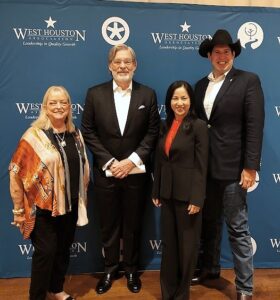Houston’s rapid growth presents both challenges and opportunities, and as development expands across the region, leaders are working to ensure that infrastructure, mobility, and land use planning keep pace. The Planning for Houston’s Future forum featuring City of Houston Planning & Development Director Vonn Tran and Planning Commission Chair Lisa Clark, the  event brought together public and private sector leaders to discuss how Houston can continue to thrive while becoming more efficient, resilient, and well-connected.
event brought together public and private sector leaders to discuss how Houston can continue to thrive while becoming more efficient, resilient, and well-connected.
The panelists shared valuable insights in a discussion moderated by WHA Board Chair David Hightower on streamlining permitting, enhancing customer service efficiency, and fostering the collaboration needed to build resilience in our communities.
The event started with David asking, “What keeps you up at night?” Lisa responded without hesitation—water infrastructure issues. Ensuring that Houston has a reliable, sustainable water supply is a critical challenge as the city grows. But when asked what excites her, Lisa pointed to the new administration under Mayor Whitmire, expressing optimism about its ability to tackle these pressing issues with fresh energy and focus.
 Vonn emphasized that Houston is “open for business” and highlighted ongoing efforts to streamline processes and make her department more efficient. Lisa agreed, noting that things are moving faster, and the collaboration between agencies and stakeholders is improving. A prime example Lisa shared was the successful coordination on Underground Residential Distribution (URD), where the public and private sectors came together to solve complex infrastructure challenges. By bringing all stakeholders to the table, they were able to create a workable solution that benefits the community.
Vonn emphasized that Houston is “open for business” and highlighted ongoing efforts to streamline processes and make her department more efficient. Lisa agreed, noting that things are moving faster, and the collaboration between agencies and stakeholders is improving. A prime example Lisa shared was the successful coordination on Underground Residential Distribution (URD), where the public and private sectors came together to solve complex infrastructure challenges. By bringing all stakeholders to the table, they were able to create a workable solution that benefits the community.
Efficiency was a major theme of the discussion, with Vonn stressing that “when you tell me things are not working, I’m listening.” She detailed efforts to review processes and procedures, ensuring that they make sense and remove unnecessary roadblocks. One example was allowing planning staff to check tree compliance rather than requiring separate approval from the forestry department—saving time while maintaining quality standards.
Technology is also playing a key role in improving efficiency. Vonn highlighted updates to the city’s online tools, a new dashboard for tracking progress, and a partnership with the Harris County Clerk’s Office to introduce electronic plat recording. This modernization effort could reduce approval times from four weeks to just two, while eliminating the need for applicants to visit county offices in person. These changes, she explained, are about more than just speed—they represent a shift toward a smarter, more responsive city government.
Mobility and connectivity emerged as a central issue of the discussion. Vonn made it clear that roadways are an asset and that the administration “will preserve existing road options” because they are essential for city services like police, fire, and solid waste. While transit and bike infrastructure will be incorporated where practical, mobility decisions will be data-driven and based on current demand. There is also a focus on METRO Now and last-mile solutions to improve connectivity. Another key initiative is the “bike-to-trail” plan, which aims to better connect Houston’s existing trail systems and enhance alternative transportation options. Lisa added that hike-and-bike mobility should be supported by dedicated trails rather than shared roadways, improving safety and usability.

The discussion also touched on future trends in transportation. With advancements in autonomous vehicles and increased vehicle efficiency, Houston needs to anticipate and adapt to evolving mobility needs. The panelists emphasized a practical approach to development, ensuring that growth is managed in a way that balances infrastructure needs with long-term sustainability.
Land use and development strategies were another major topic. Lisa underscored the importance of “building up, not just out,” advocating for infill development and redevelopment. Thoughtful urban planning can help Houston make better use of existing infrastructure while fostering more sustainable, connected communities.
The role of trees in urban planning was also discussed, particularly highlighting the importance of planting the right tree in the right place. Panelists stressed the need to encourage thoughtful tree placement to enhance community resilience while preventing conflicts with power lines and other infrastructure.
Throughout the discussion, optimism remained a key theme. Vonn encouraged attendees to stay positive, emphasizing that Houston has tremendous opportunities ahead. By refining processes, leveraging technology, and fostering collaboration, the city is positioning itself to grow efficiently and effectively while maintaining a high quality of life for its residents.
 Houston’s future is bright, and as leaders continue to refine the way the city grows, the focus remains on building a more connected, resilient, and well-functioning metropolis. The challenges ahead are significant, but with the right strategies and partnerships in place, Houston is well on its way to meeting them head-on.
Houston’s future is bright, and as leaders continue to refine the way the city grows, the focus remains on building a more connected, resilient, and well-functioning metropolis. The challenges ahead are significant, but with the right strategies and partnerships in place, Houston is well on its way to meeting them head-on.
Thank you to our sponsors for making this event possible! We’d also like to give a special thank you to Lisa Clark, David Hightower, and Vonn Tran for taking the time to speak with WHA Members.
